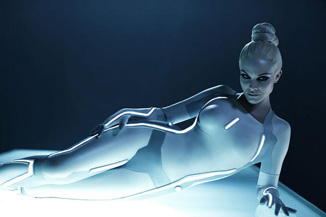Chapter Two: Tron Legacy
By Brett Ballard-Beach
June 9, 2011
Thirty years later, it has long lost its status as being on the cutting edge of anything, but in that stead, it has come to rest as a sci-fi anomaly of sorts. Lisberger never attempted to duplicate Tron on the big screen (his only other directorial efforts were a 1987 John Cusack teen comedy and a 1989 Isaac Asimov adaptation). Now that the realm of CGI and motion capture animation are where a lot of the special effects in films reside, the look of the film can come across as homespun as an etching by Miyazaki. Tron once looked to (be) the future - in perhaps the way that flying cars seemed to in the middle part of the last century - but now it’s an emblem of an alternate past via the road not travelled. In a way that’s quaint (not meant condescendingly), it wears the neon-colored hearts of Lisberger and his collaborators on its techno-sleeve, something that carries it past the clunkiness of its storytelling.
Tron Legacy arrived last December via three decades of false starts, retoolings, a 2002 first-person “sequel” videogame (Tron 2.0) and bearing the pressure of being the jumping-off point for future platforms of the Tron brand (including another videogame, a television series set to debut in 2012, and the possibility of a new trilogy of feature films featuring the new characters introduced in Tron Legacy). Considered in retrospect after viewing it last week, it is an odd mix of remake, reboot, and franchise (re) launch with a storyline designed to continue - somewhat awkwardly - from the original, and then cancel out those elements to make way for storylines hinted at (or barely suggested) by brief scenes early on and at the end.
To carry this one step further, the importance of the Tron brand over the Legacy aspect of things is also intriguing to me. Note the Tron logo/title gets prime real estate at the start of the film while Tron Legacy is shunted off to the end credits with Legacy in much smaller font, as it is on the poster. In the recently reissued edition of Tron with multiple versions of Tron Legacy and bonus material, Tron has been heralded as “The Original Classic,” perhaps so it will stand out from Tron Legacy, where the subtitle seems to fade into the background on both the cover and the spine.
With all that intervening time to work on a screenplay and story, and with the task eventually falling to a pair of writers from Lost, it wouldn’t be a misdirected hope that the plot and dialogue of Tron Legacy would rise above that of Tron. Unfortunately, since this turns out to be a placeholder film, the result is a storyline that reproduces all the major beats and key action sequences of Tron and infuses them with elements from other s/f films, most notably the philosophical mysticism of The Matrix films (man vs. machine), and the cyberpunk Pinocchio-esque journey at the heart of A.I. Artificial Intelligence (a boy searching for a father figure in a bright, garish metropolis).
In the vein of borrowing/homage/rip-off, even the movie’s poster art and a climatic scene from Tron Legacy boldly recreate the same iconic moments from their Tron counterparts. (The movie goes self-referentially one step even further and features a repurposed Tron poster - not for the movie, but for the Tron game as it exists in the world of Tron Legacy - in the bedroom of a young boy.)
Continued:
1
2
3
4
|
|
|
|




